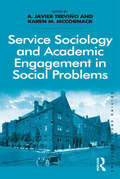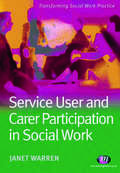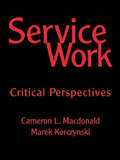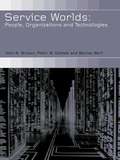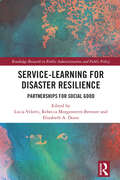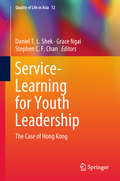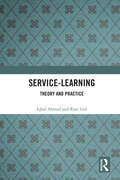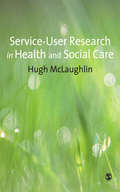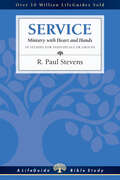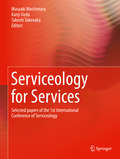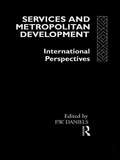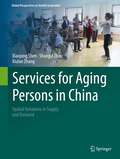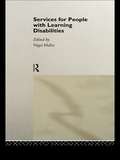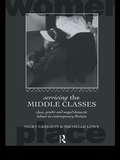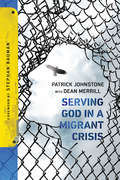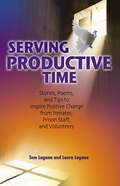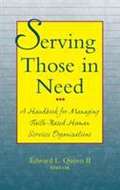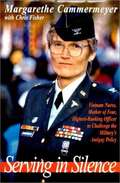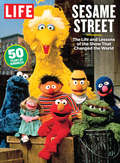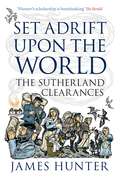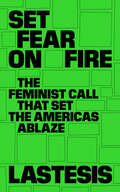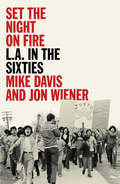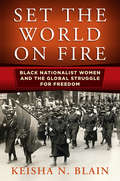- Table View
- List View
Service Sociology and Academic Engagement in Social Problems (Solving Social Problems)
by A. Javier Treviño Karen M. McCormackThis book challenges sociologists and sociology students to think beyond the construction of social problems to tackle a central question: What do sociologists do with the analytic tools and academic skills afforded by their discipline to respond to social problems? Service Sociology posits that a central role of sociology is not simply to analyse and interpret social problems, but to act in the world in an informed manner to ameliorate suffering and address the structural causes of these problems. This volume provides a unique contribution to this approach to sociology, exploring the intersection between its role as an academic discipline and its practice in the service of communities and people. With both contemporary and historical analyses, the book traces the legacy, characteristics, contours, and goals of the sociology of service, shedding light on its roots in early American sociology and its deep connections to activism, before examining the social context that underlies the call for volunteerism, community involvement and non-profit organisations, as well as the strategies that have promise in remedying contemporary social problems. Presenting examples of concrete social problems from around the world, including issues of democratic participation, poverty and unemployment, student involvement in microlending, disaster miitigation, the organization and leadership of social movements, homelessness, activism around HIV/AIDS and service spring breaks, Service Sociology and Academic Engagement in Social Problems explores the utility of public teaching, participatory action research, and service learning in the classroom as a contribution to the community.
Service User and Carer Participation in Social Work (Transforming Social Work Practice Series)
by Janet WarrenThis is the first text to examine the principal elements of service user involvement and participation across both adult and children′s services. A valuable learning resource, it draws together information from research, service users, carers and practitioners across both groups. In addition, it gives an overview of the specific knowledge, attitude and skills that social workers need for training at qualifying level and integrates theory with evidence to inform everyday social work practice. Furthermore, case studies and activities encourage reflection and the application of this knowledge to practice situations.
Service Work: Critical Perspectives
by Cameron Lynne Macdonald Marek KorczynskiEveryday, we are bombarded with advertising images of the smiling service worker. The book is written with the aim of focusing beneath the surface of these fairy tale images, to seek out and understand the reality of service workers experience. Within the sociology of work and related literatures, there are an increasing number of empirical studie
Service Worlds: People, Organisations, Technologies (The\royal Geographical Society With The Institute Of British Geographers Studies In Geography Ser.)
by Barney Warf John Bryson Peter DanielsAs the twenty-first century begins, significant changes are occurring in the way that services and goods are produced and consumed. One of the key drivers of this change is information and communications technology (ICT). It has transformed the role of space and time in patterns of economic development, in the rise of globalization and in the scale and structure of organizations. ICT has therefore accelerated the process of continual change and evolution that is the hallmark of both the capitalist economy and of organizations. Giving a student-friendly account of the diversity of theoretical perspectives, this outstanding book aids understanding the evolving economic geography of advanced capitalist economies. A series of detailed firm and employees' case studies from Europe, North America and the Asia Pacific, are used to inform useful theoretical case studies, which also investigate the significance of increased blurring of the lines between services and manufacturing functions in the production and consumption process.
Service and Style: How the American Department Store Fashioned the Middle Class
by Jan WhitakerDowntown department stores were once the heart and soul of America's pulsing Broadways and Main Streets. With names such as City of Paris, Penn Traffic, The Maze, Maison Blanche, or The Popular, they suggested spheres far beyond mundane shopping. Nicknames reflected the affection customers felt for their favorites, whether Woodie's, Wanny's, Stek's, O.T.'s, Herp's, or Bam's. The history of downtown department stores is as fascinating as their names and as diverse as their merchandise. Their stories encompass many themes: the rise of decorative design, new career paths for women, the growth of consumerism, and the technological ingenuity of escalators and pneumatic tubes. Just as the big stores made up their own small universes, their stories are microcosmic narratives of American culture and society. The big stores were much more than mere businesses. They were local institutions where shoppers could listen to concerts, see fashion shows and art exhibits, learn golf or bridge, pay electric bills, and plan vacations – all while their children played in the store's nursery under the eye of a uniformed nursemaid.From Boston to San Diego and Miami to Seattle, department stores symbolized a city's spirit, wealth, and progressiveness. Situated at busy intersections, they occupied the largest and finest downtown buildings, and their massive corner clocks became popular meeting places. Their locations became the epicenters of commerce, the high point from which downtown property taxes were calculated. Spanning the late 19th century well into the 20th, their peak development mirrors the growth of cities and of industrial America when both were robust and flourishing. The time may be gone when children accompany their mothers downtown for a day of shopping and lunch in the tea room, when monogrammed trucks deliver purchases for free the very same day, and when the personality of a city or town can be read in its big stores. But they are far from forgotten and they still have power to influence how we shop today. Service and Style recreates the days of downtown department stores in their prime, from the 1890s through the 1960s. Exploring in detail the wide range of merchandise they sold, particularly style goods such as clothing and home furnishings, it examines how they displayed, promoted, and sometimes produced goods. It reveals how the stores grew, why they declined, and how they responded to and shaped the society around them.
Service-Learning for Disaster Resilience: Partnerships for Social Good (Routledge Research in Public Administration and Public Policy)
by Lucia Velotti Rebecca Morgenstern Brenner Elizabeth A. DunnThis book is the first to discuss, in practical and theoretical terms, the pedagogical approach of service-learning to establish partnerships for social good that build disaster resilience. Across twelve chapters a collection of academics and practitioners provide insights on the benefits of utilizing service-learning to address existing needs, build community capacity, and strengthen social networks while enhancing student learning. Key features: Discuss how sustainable service-learning partnerships can contribute to building disaster-resilient communities; Provide practical tools to cultivate and manage collaborative partnerships, and engage in reflective practices; Integrate disciplines to create innovative approaches to complex problems; Share best practices, lessons learned, and case examples that identify strategies for integrating service-learning and research into course design; Offer considerations for ethical decision-making and for the development of equitable solutions when engaging with stakeholders; Identify strategies to bridge the gap between academia and practice while highlighting resources that institutions of higher education can contribute toward disaster preparedness, response, recovery, and mitigation. Service-Learning for Disaster Resilience will serve as a user-friendly guide for universities, local government agencies, emergency management professionals, community leaders, and grassroots initiatives in affected communities.
Service-Learning for Disaster Resilience: Partnerships for Social Good (Routledge Research in Public Administration and Public Policy)
by Lucia Velotti Rebecca Morgenstern Brenner Elizabeth A. DunnThis book is the first to discuss, in practical and theoretical terms, the pedagogical approach of service-learning to establish partnerships for social good that build disaster resilience. Across 12 chapters a collection of academics and practitioners provide insights on the benefits of utilizing service-learning to address existing needs, build community capacity, and strengthen social networks while enhancing student learning.Key features: Discuss how sustainable service-learning partnerships can contribute to building disaster-resilient communities; Provide practical tools to cultivate and manage collaborative partnerships, and engage in reflective practices; Integrate disciplines to create innovative approaches to complex problems; Share best practices, lessons learned, and case examples that identify strategies for integrating service-learning and research into course design; Offer considerations for ethical decision-making and for the development of equitable solutions when engaging with stakeholders; Identify strategies to bridge the gap between academia and practice while highlighting resources that institutions of higher education can contribute toward disaster preparedness, response, recovery, and mitigation. Service-Learning for Disaster Resilience will serve as a user-friendly guide for universities, local government agencies, emergency management professionals, community leaders, and grassroots initiatives in affected communities.
Service-Learning for Youth Leadership: The Case Of Hong Kong (Quality of Life in Asia #12)
by Daniel T. L. Shek Grace Ngai Stephen C. F. ChanThis book examines service-learning – a valuable means of promoting civic engagement and youth leadership in students by enabling them to apply their knowledge to needy people in the community. It describes selected service-learning projects in different areas by highlighting the subjects being offered, service site(s), completed service projects, evaluation findings and teachers’ reflections. Although service-learning has increased tremendously in the West, its development in different Chinese societies is still in its infancy. As such, this book provides valuable insights on the implementation and future directions of the service-learning movement in China by documenting lessons learned and sharing success stories. It also discusses related evaluation findings and impacts on students to show that service-learning can increase students’ empathy, social awareness, social responsibility and psychosocial skills and as a result can improve their quality of life. In addition, the book highlights how service-learning activities promote the well-being of the clients and communities being served. It also stimulates thinking and sharpens the thoughts of educators, administrators and those who wish to promote the quality of life of students and service recipients through service-learning.
Service-Learning: Theory and Practice
by Iqbal Ahmad Rani GulThis book examines key concepts, principles, and applications of the service-learning approach. Service-learning is a community-based educational approach to improve a student’s academic, personal, leadership, civic, and professional development through civic engagement. Unlike other traditional approaches to education, service-learning students can use their classroom-based knowledge and skills in a real-life context in collaboration with community organisations and residents. This volume explores the theory, research, and practices of how service-learning is understood, implemented, and evaluated in different contexts. It provides essential guidelines to implement and integrate service-learning at educational institutions through extensive discussions on the principles, philosophical challenges, opportunities, and its applications. Key themes include: • Theory of service-learning • Concept of service-learning • Challenges to service-learning • Applications of service-learning • Service-learning as professional development • Service-learning as communication Accessibly written, this book would be of interest to faculty, students, community organisations, and researchers working in the areas of education, pedagogy, sociology, and social work.
Service-User Research in Health and Social Care
by Dr Hugh MclaughlinThis book represents a major contribution to the development and increasingly accepted importance of involving service users in research. It argues that this development is neither a fad nor a cure-all, and highlights the strengths, weaknesses, benefits and costs of the approach. It is the first text to analyze the involvement of service users from the conception of a research idea to the finish of the project. The author critically considers why service users even bother getting involved, and goes on to explore ethical issues, covering key topics such as: - the practice of service-user research; research conception, recruitment, training, development of research tools, data collection, analysis, writing up, dissemination and endings - barriers to involvement and the limitations of service-user research, with practical advice on how these can be addressed - both sameness and difference in relation to involving young people in research - alternative futures for involving service users in research. Using reflexive questions and practical examples to challenge the reader to consider his/her own position in relation to these issues, this book should occupy a central place on the shelves of all undergraduate health and social welfare students. It is also crucial reading for those studying postgraduate professional qualifications and research methods, and for practitioner researchers and policy staff considering the best ways of undertaking meaningful service user involvement.
Service: Ministry with Heart and Hands (LifeGuide Bible Studies)
by R. Paul StevensIn this LifeGuide Bible Study includes ten sessions exploring service in a variety of contexts: family, the physical creation, society, the city, neighbors, relationships, the church and the workplace. Looking inside ministry specifically, R. Paul Stevens examines examples of service that were motivated by imagination, passion, faith, hope and love—from Genesis to Revelation. Out of these studies you will discover how to live and serve wholeheartedly. No matter what your profession, you are a full time minister of Jesus Christ. For over three decades LifeGuide Bible Studies have provided solid biblical content and raised thought-provoking questions—making for a one-of-a-kind Bible study experience for individuals and groups. This series has more than 130 titles on Old and New Testament books, character studies, and topical studies.
Serviceology for Services
by Masaaki Mochimaru Kanji Ueda Takeshi TakenakaServices are key activities in the globalization of the economy and also underlie the quality of life of local residents. The advanced work presented in this book was selected from the proceedings of the First International Conference on Serviceology (ICServ2013), held October 16-18, 2013 in Tokyo. This book provides a useful overall guide to the state of the art in theory and practice of services for researchers in various fields, including engineering, marketing, economics, and others. This work also facilitates the scientific systematization of services and promotes technological developments for solutions of industrial issues.
Services and Metropolitan Development: International Perspectives
by P. W. DanielsThe dynamics of national and international urban systems, as well as individual metropolitan areas, are closely connected with the decisions and actions of firms and institutions in the service sector. Services and Metropolitan Development explores the processes guiding both the development and the spatial impacts of services on the urban system and individual areas. The book describes the symbiotic relationship between the internationalisation of services and the effects of this re-structuring on urban systems. The multidisciplinary nature of the subject and its global development are reflected by the international range of contributors, specialists in geography, business management, economics and public administration. The book analyses the theoretical, conceptual and measurement issues confronting research on the development of services in North America, Northern Europe and Australia.
Services for Aging Persons in China: Spatial Variations in Supply and Demand (Global Perspectives on Health Geography)
by Xiaoping Shen Shangyi Zhou Xiulan ZhangThis volume draws upon one of the first comprehensive studies on the regional variations of services for aging persons in China to provide an empirical and theoretical understanding of the impact of China's rapidly growing aging population on the country's socioeconomic, cultural, and political systems. In three parts, the manuscript combines case-oriented comparative methods with variable-oriented statistical and GIS analyses to examine the spatial patterns and relationships between supply and demand of affordable and accessible services for aging persons in China. Part one gives a historical review of population aging in China, including the development of services for aging persons and government policies and programs geared towards elders. Part two provides an analysis of spatial variations of supply and demand for services including food, housing, health, and community services for aging persons. Part three uses case studies to analyse the regional and local dimensions of elderly services. Suggestions are made for future planning, development, and policies. This book will appeal to policy makers, city planners, service providing businesses, and advanced undergraduate and graduate students studying economic geography, planning, and regional development.
Services for People with Learning Disabilities
by Nigel MalinServices for People with Learning Disabilities provides a broad review of available services for people with learning disabilities. It describes the present network of services and explains the NHS and Community Care Act (1990) in terminoloy accessible to health care professionals and others engaged in this area. It looks in detail at the concepts underpinning new legislation, including care-management and assessment, quality and inspection, and inter-agency planning, and it supplies up-to-date information on current topics such as advocacy and empowerment, and recreation and leisure. An invaluable resource for all practitioners in health and community care, Services for People with Learning Disabilities will also give professionals and carers a much greater understanding of the changes and improvements that are still needed.
Servicing the Middle Classes: Class, Gender and Waged Domestic Work in Contemporary Britain (Routledge International Studies of Women and Place)
by Michelle Lowe Nicky GregsonServicing the Middle Classes investigates the recent rise in demand by middle class families for waged domestic labour and the consequent growth of a new `servant' class.Examining the position of nannies and cleaners, the authors explore the national socio-economic trends which have led to this new phenomenon and the profound changes this reflects in our concepts of motherhood and class and gender relations.
Serving God in a Migrant Crisis: Ministry to People on the Move (Operation World Resources)
by Dean Merrill Stephan Bauman Patrick Johnstone"God has used migration for millennia to achieve his purposes for his people," writes Patrick Johnstone. "He is doing so again in our time." Millions are on the move, driven by war, drought, terrorism, poverty, failed states, environmental catastrophes, disease, revolutions, and the desire for a better life. Christians have a unique perspective on the migrant crisis: after all, Jesus was a refugee. So were Abraham, Joseph, and Moses. Today, some turn their backs on refugees. In Serving God in a Migrant Crisis, Patrick Johnstone and Dean Merrill help us understand what's causing today's refugee crisis, explore Christian theology and tradition on migration, and show us how Christian workers around the globe are opening their hearts to embrace these modern outcasts. "The world has literally come to our doorstep," they write. "Will we open the door?"
Serving Productive Time: Stories, Poems, and Tips to Inspire Positive Change from Inmates, Prison Staff, and Volunteers
by Tom Lagana Laura LaganaFrom the coauthor of Chicken Soup for the Prisoner's Soul—a program that develops positive change for inmates and their loved ones With their books Chicken Soup for the Prisoner's Soul and Chicken Soup for the Volunteer's Soul, Tom and Laura Lagana have shown readers how to make positive use of their time—whether they are serving others or serving time. In Serving Productive Time they go one step further, using powerful stories, poems, and cartoons created by inmates and others to address the realities of penal existence. They build on these voices of experience with essays and advice that show inmates how to truly make their time count, and give meaning to their lives right now, while making amends for their crimes and working toward release. Inspires inmates to use programs and resources, perform positive deeds, and acquire skills Empowers correctional staff, counselors, families, and volunteers to help inmates who want to make positive changes in their lives
Serving Those in Need: A Handbook for Managing Faith-Based Human Services Organizations
by Edward L. Queen IIGiven the increased pressures and higher demand on social-service organizations, faith-based providers must find ways to increase their effectiveness while maintaining their religious distinctiveness.
Serving in Silence: The Story of Margarethe Cammermeyer
by Chris Fisher Margarethe CammermeyerIn 1989, in a routine interview for top-secret security clearance - a requisite for admission to the Army War College - Colonel Margarethe Cammermeyer was asked about her sexual orientation. After pausing for a moment to take a breath, she said, "I am a lesbian." Thus began an ordeal that continues to this day. Intense media coverage of the former colonel's dismissal from the U.S. Army has stirred debate all the way to the presidency. Her Bronze Star for duty in Vietnam, her being named Nurse of the Year by the Veterans Administration, and her role as Chief Nurse of the Washington State National Guard marked a long and distinguished military career. Her goal to become Chief Nurse of the entire National Guard was abruptly ended in 1992 by her discharge based on sexual orientation. With the same calm, assured articulation that won her one leadership position after another, Cammermeyer writes of her decision to challenge official policy on homosexuality and of her recent victory in Federal District Court. But this is not only a book about what she described in Time as "sticking around to get beaten up." It is also about coming of age, being a mother, and finding one's center; about "coming out," the daily horrors of nursing in Vietnam, and a female soldier's life.
Sesame Street (LIFE)
by The Editors of LIFELIFE Magazine presents Sesame Street for LIFE Sesame Street.
Set Adrift Upon the World: The Sutherland Clearances
by James HunterThis true story of a mass eviction in nineteenth-century Scotland is &“a moving, gripping, definitive account of a struggle for survival (Scots Magazine).A Saltire Society History Book of the Year They would be better dead, they said, than set adrift upon the world. But set adrift they were—thousands of them, their communities destroyed, their homes demolished and burned. Such were the Sutherland Clearances, an extraordinary episode involving the deliberate depopulation of much of a Scottish Highlands county. What was done in the course of it was planned and carried out by a small group of men and one woman, seeking a more profitable use of the land. Most of those involved wrote a great deal about their actions, intentions, and feelings, and much of it has been preserved. There are no equivalent collections of material from those whose communities ceased to exist. Their feelings and fears are harder to access, but by no means irrecoverable. In this book, James Hunter tells the story of the Sutherland Clearances. His research took him to archives in Scotland, England, and Canada, to the now deserted valleys of Sutherland, to the frozen shores of Hudson Bay. The result is a story of a people&’s struggle for survival in the face of tragedy and disaster, covering experiences not featured in any previous such account. &“Detailed and unsparing . . . . [The author] is careful to present the evidence for all he records.&” —London Review of Books
Set Fear on Fire: The Feminist Call That Set the Americas Ablaze
by LasTesisA fiery feminist manifesto from the Chilean performance collective who led the rallying cry for today's mass feminist movement across South AmericaAfter the feminist art collective LASTESIS created their performance &“A Rapist in Your Path&” in their native Chile, it went viral across the globe, becoming the anthem of the grassroots feminist movements in South America and around the world. This is their manifesto, an angry, unrepentant tour-de-force that moves through rage, femicide, abortion, homophobia, feminist art, and the oppression of the state to argue for a feminist world based on collective struggle and a visionary political art.Translated by Camila Valle.
Set the Night on Fire: L.A. in the Sixties
by Mike Davis Jon WienerA magisterial, riveting movement history of Los Angeles in the SixtiesLos Angeles in the sixties was a hotbed of political and social upheaval. The city was a launchpad for Black Power—where Malcolm X and Angela Davis first came to prominence and the Watts uprising shook the nation. The city was home to the Chicano Blowouts and Chicano Moratorium, as well as being the birthplace of &“Asian American&” as a political identity. It was a locus of the antiwar movement, gay liberation movement, and women&’s movement, and, of course, the capital of California counterculture. Mike Davis and Jon Wiener provide the first comprehensive movement history of L.A. in the sixties, drawing on extensive archival research and dozens of interviews with principal figures, as well as the authors&’ storied personal histories as activists. Following on from Davis&’s awardwinning L.A. history, City of Quartz, Set the Night on Fire is a historical tour de force, delivered in scintillating and fiercely beautiful prose.
Set the World on Fire: Black Nationalist Women and the Global Struggle for Freedom (Politics and Culture in Modern America)
by Keisha N. BlainIn 1932, Mittie Maude Lena Gordon spoke to a crowd of black Chicagoans at the old Jack Johnson boxing ring, rallying their support for emigration to West Africa. In 1937, Celia Jane Allen traveled to Jim Crow Mississippi to organize rural black workers around black nationalist causes. In the late 1940s, from her home in Kingston, Jamaica, Amy Jacques Garvey launched an extensive letter-writing campaign to defend the Greater Liberia Bill, which would relocate 13 million black Americans to West Africa.Gordon, Allen, and Jacques Garvey—as well as Maymie De Mena, Ethel Collins, Amy Ashwood, and Ethel Waddell—are part of an overlooked and understudied group of black women who take center stage in Set the World on Fire, the first book to examine how black nationalist women engaged in national and global politics from the early twentieth century to the 1960s. Historians of the era generally portray the period between the Garvey movement of the 1920s and the Black Power movement of the 1960s as one of declining black nationalist activism, but Keisha N. Blain reframes the Great Depression, World War II, and the early Cold War as significant eras of black nationalist—and particularly, black nationalist women's—ferment.In Chicago, Harlem, and the Mississippi Delta, from Britain to Jamaica, these women built alliances with people of color around the globe, agitating for the rights and liberation of black people in the United States and across the African diaspora. As pragmatic activists, they employed multiple protest strategies and tactics, combined numerous religious and political ideologies, and forged unlikely alliances in their struggles for freedom. Drawing on a variety of previously untapped sources, including newspapers, government records, songs, and poetry, Set the World on Fire highlights the flexibility, adaptability, and experimentation of black women leaders who demanded equal recognition and participation in global civil society.
